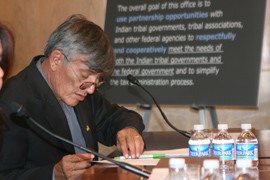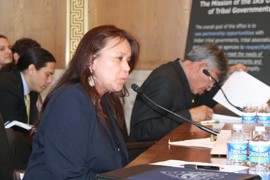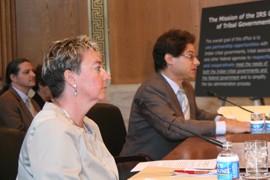Cronkite News has moved to a new home at cronkitenews.azpbs.org. Use this site to search archives from 2011 to May 2015. You can search the new site for current stories.
Tribes look to Congress to stop IRS from taxing government benefits
WASHINGTON – Tribal officials asked a Senate committee Thursday to block taxation by the Internal Revenue Service of government benefits to the tribes and their members.
They said the IRS has been auditing several tribes across the country, requesting documents on aid such as school clothes, burial rituals, elder care and even minor housing repairs. Witnesses told the Senate Indian Affairs Committee that the actions violate tribal tradition and threaten the welfare of tribes across the country.
“This is over-extending the IRS’s authority, they are acting more on value judgment than any law,” said John Yellow Bird Steele, president of the Oglala Sioux Tribe. “That is why we request legislation to straighten the IRS up – they just don’t know how to treat us like an organization.”
For the IRS to improve its dealings with the tribes, the two need to have a government-to-government relationship, said Athena Sanchey-Yallup, secretary of the Tribal Council for the Yakama Nation. That requires more than just a letter explaining how and when the tribes will be taxed, she said.
“Government-to-government to me is face to face, even with the technology we have today,” Sanchey-Yallup said. “It is sitting down with my 14 elected officials and having a discussion.”
The IRS is not singling out tribal government welfare programs for examination, but uses the same criteria for all audits, said Christie Jacobs, the IRS director for the Office of Indian Tribal Governments.
In order for any organization – tribal or non-tribal – to be excluded from taxes and benefits, the payments must be made under a government program and promote the general welfare and not represent compensation for services, Jacobs said.
But Sen. Daniel Akaka, D-Hawaii, the chairman of the committee, told the IRS that the ability of tribes to provide for the welfare of their members is critical to the self-determination of tribal governments.
“This is especially important given that one out of every four people in the U.S. live in poverty,” he said.
A Treasury Department official said his agency has heard the concerns raised by the tribes and it is committed to working with them throughout the process of consultation over what benefits should be taxed.
Aaron Klein, deputy assistant secretary for Economic Policy Coordination at the Treasury, said the issues discussed are real concerns about programs that affect real people every day. There is inherent tension in those discussions, he said, but both sides are seeking a resolution a quickly as possible.
“It would be my hope that we’re able to balance those senses of competing interest, and issue guidance in the not-too-distant future,” Klein said. “But I don’t do this as an end point to the process, I view it as a continual process.”









